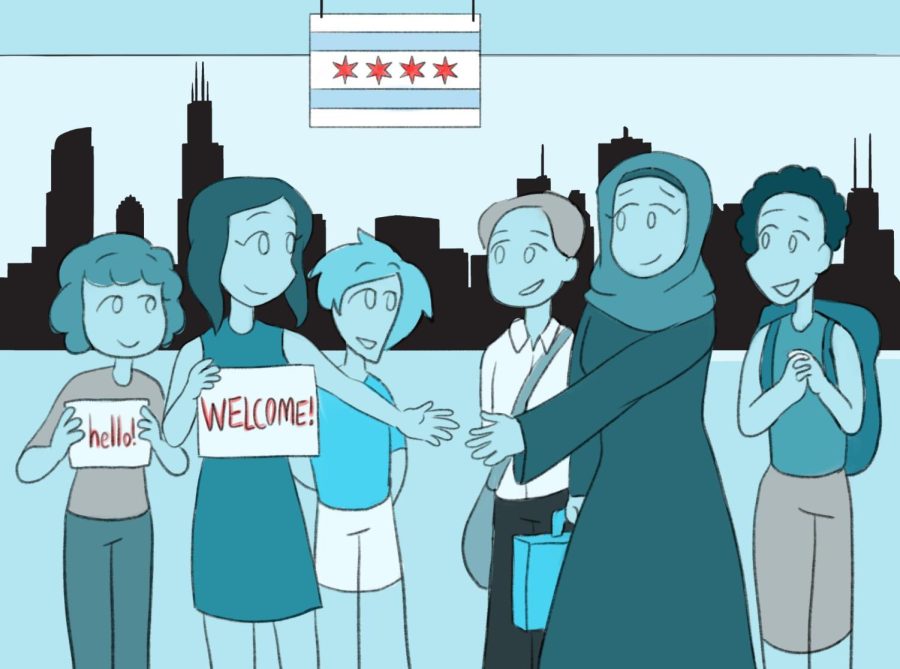Government establishes private refugee sponsorship program
There are millions of private citizens across the country that have a dedication to the refugee cause, and now those citizens have a pipeline that directly connects them to the individuals they seek to help.
That pipeline is called Welcome Corps, the new federal program officially launched on Jan. 19, 2023, and acts as the middleman between refugees coming to the U.S. and American citizens with a desire to provide support.
The program connects sponsorship groups of five or more people, all above the age of 18, to refugees that have been admitted to the U.S. under the United States Refugee Admissions Program (USRAP).
“This kind of private sponsorship effort enables Americans from across the country to sponsor refugees, which is unprecedented,” said Alisa Roadcup, executive director of the Chicago Refugee Coalition (CRC).
The CRC is just one of several nonprofits within Chicago that work with refugees and have already pledged their support for Welcome Corps. These organizations will take part in the program by providing supplemental support, education and community connections to sponsors and refugees.
“[The CRC] is involved to the extent that [it is] a referral resource and provides advice and support,” Roadcup said. “In Chicago, there’s a massive, diverse, and rich refugee community, so making those connections is really our largest role within our partnership with the Welcome Corps.”
The role of private sponsors through Welcome Corps is to welcome refugees into their community and provide these refugees support throughout their first 90 days in the U.S. This includes services like welcoming refugees at the airport, finding them housing, aiding with documentation and providing a minimum of $2,275 per refugee.
“It’s a significant commitment on the part of individual sponsors, but it’s also an extraordinary opportunity for Americans who care about refugees and believe in radical hospitality, and in this ethical and moral call to welcome the stranger,” Roadcup said.
Roadcup’s confidence in the validity of Welcome Corps is substantiated by the expertise that the program’s foundation was built on.
“[Welcome Corps] was advised by Welcome.Us,” Roadcup said. “And that coalition has an advisory board of presidents, Nobel Peace Prize winners and people of very significant social and academic influence who are very sound in terms of their experience in international development, public policy and foreign policy.”
While its expansiveness is a trailblazing characteristic within the realm of U.S refugee sponsorship efforts, this program is not being built entirely from scratch. One of the initiatives that originally sparked the flame for what is now Welcome Corps was the Sponsor Circle Program for Afghans.
“We’ve been hearing about this idea [for Welcome Corps] for a while, and it’s modeled off of what was being done during the Afghan resettlement process in August of 2021,” said Shana Wills, founder and executive director of Refugee Education and Adventure Challenge. “Because of the successes of being able to allocate so many of the Afghan newcomers to sponsorship groups, they obviously concluded that they were going to create the Welcome Corps.”
Not only was the Welcome Corps prompted by previous U.S. initiatives, but it also draws inspiration from a Canadian program of similar structure. Additionally, Wills points to national refugee resettlement studies as additional catalysts for change and innovation that led to Welcome Corps’ creation.
“Prior to COVID, national expert foundations, think tanks, and national resettlement agencies had come together and, through a series of various reports, all came to unanimous conclusion that there had to be a revamp of the U.S. refugee resettlement program,” Wills said. “Looking at Welcome Corps, it’s really amazing and heartening to see that the outcomes of all of these reports have been taken seriously.”
While the experts that have dedicated their lives to aiding refugees are vocal about their excitement for the future of Welcome Corps, they recognize the importance of sharing their inhibitions as well.
Syrian Community Network (SCN) is another Chicago-based refugee nonprofit that has pledged its support for Welcome Corps. Suzanne Akhras, SCN founder and executive director, is hoping there will be financial aid from the federal government for organizations that are providing technical support for Welcome Corps sponsors and refugees.
“There is no promise that the government will give community organizations like mine any funding. How do you expect us to do all of this and there is no funding?” Akhras said. “We believe in it and our values are in alignment, but they should also support community organizations like SCN and others to do this type of work. It’s a lot of work.”
Wills is concerned with ensuring sponsors are going to receive ample training and education related to the work they’ll be doing.
“[There are] a lot of volunteers who have really good intentions and really good hearts, but they don’t really know the work that it takes to integrate refugee newcomers into the system and into our society,” Wills said.
Roadcup projected that by April of this year, the U.S. will see its first influx of refugees coming into the country through Welcome Corps, and the program has already seen over 200,000 responses to its initial bid for applicants.
“People want to do this, and people want to volunteer and they want to do something with their own hands so that they’re directly making an impact,” Akhras said.
Now, for the first time in U.S. history, private citizens have an opportunity to directly impact the fates of the thousands of individuals hoping to rebuild their lives in this country.







